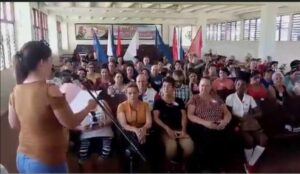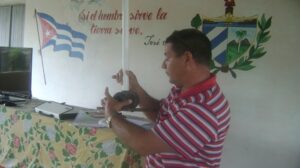The city of Wuhan, in the province of Hubei, has been a hotbed of scientific ideas, academic exchanges, technological development, and aerospace research since Wednesday. Why is it important to hold a Space Cooperation Forum between China and the Community of American and Caribbean States? What role does Cuba play in this scenario?
Exploring the universe is a common dream of all the countries of the world, recalled Zhang Guoqing, Vice Premier of the State Council of the Asian giant during the opening ceremony of the Forum.
The enigmas of the galaxy, the Milky Way, and all the planets that make up the Solar System are secrets that China set out to unveil and put all its scientific potential into that endeavor until April 24, 1970, when it became the fifth country to successfully launch a satellite into space. From then on, it has experienced a dizzying rise in the development of the aerospace industry, based on the peaceful use of space, equality, mutual benefit, and the inclusive nature of international cooperation.
The main objective of this meeting in Wuhan is to reach a consensus among the international scientific community: to discuss relevant aspects in this area and to shape a common strategy for cooperation in space-related issues that will contribute to the effort to build a community of shared destiny, one of the premises of China’s foreign policy. However, it is no coincidence that Celac member countries are participating with China in this joint construction.
The celebration of the event coincides with the 10th anniversary of the establishment of the China-Celac Forum, a mechanism founded through a Special Declaration of the Heads of State and Government who participated in the II Celac Summit, held on January 28-29, 2014 in Havana.
President Xi Jinping himself in a letter read at the opening of the meeting stressed that in the past 10 years, friendly cooperation between China and Latin America and the Caribbean has flourished in various fields, which has propelled China-CELAC relations into a new era of equality, mutual benefit, innovation, openness and benefit of the peoples.
«I am glad to see that, in recent years, China-Latin America and the Caribbean space cooperation has yielded fruitful results. The tides have made breakthroughs in cooperation in the fields of remote sensing satellites, communication satellites, and space station networks, which have played an important role in promoting scientific and technological progress, strengthening region, al interconnection, and improving people’s livelihoods and well-being,» the president wrote.
Cuba’s ambassador to China, Alberto Blanco Silva, explained in an exclusive interview with Cubadebate: «Promoting innovation in this area will contribute to improvements in areas such as agricultural planning, meteorological studies, dis, aster prevention, and reduction, among other issues». In this scenario, the Asian giant does not take the whole cake but promotes the participation of the international scientific community in an inclusive manner.
Now, why is it important for Cuba to participate in this China-Celac Space Cooperation Forum? Before answering, it should be noted that representing the largest of the Antilles are Jorge Martin Ruiz, director of the National Office of Hydrography and Geodesy (ONHG), and Dr. in Science Ida Ines Pedroso Herrera, head of the National Risk Assessment Group of the National Civil Defense General Staff.
According to Blanco Silva, Cuban participation in this type of forum contributes effectively to fostering cooperation ties in this area, not only with China but also with other Celac member countries. «This cooperation covers topical aspects for our country such as the use of satellite data for agriculture, meteorology, climate ch, age studies, and the preparation of plans against risks and vulnerabilities.»
The event’s program includes sub-forums on space infrastructure for sustainable socio-economic development; deep space exploration and space science; innovative development of the space supply chain; and global governance of outer space.
Precisely, Dr. Ida Inés Pedroso Herrera presents Cuba’s experiences in the «Application of remote sensors as an effective tool in disaster risk reduction», a topic that, due to the geographical position of the largest of the Antilles and the regular impact of meteorological phenomena, has focused the attention of the Cuban government and science.
And, as this type of work benefits from satellite images, mathematical mo, dealing and other aspects that other countries are ahead of, the Forum may be a w ofay to establish cooperation links that may result in the improvement of the research developed by this Cuban group. This is just one example.
«There are more than three institutions that have shown interest in the work developed by Cuban researchers. Today’s session (Wednesday local time) closed with the so-called Wuhan Declaration which, in practice, is nothing more than a guide for the member countries of the China-Celac group for cooperation in space issues, since it is not binding, nor does it require the signature of the member states. It is based on the recognition of the role played by this bloc in the integration of our region and its link with China, referring to the Joint Action Plan for areas of cooperation (2022-2024) signed during the Third Ministerial Meeting of the China-Celac Forum,» the ambassador explained to Cubadebate.
In addition, he adds, this statement takes into account the increase in cooperation with the Latin American and Caribbean region in recent years.
It highlights seven fundamental points:
- To make the space cooperation forum a source of information and shared solutions for space sciences.
- Support capacity building in the application of satellite communications, navigation, and earth observation technologies.
- Establish mechanisms for long-term training, education, and coaching of personnel in these areas.
- Encourage exchanges and foster the development of the younger generation.
- Give great importance and recognition to the study of deep space as an engine for the development of knowledge, technology, and industry.
- Encourage cooperation between the various space agencies.
- Strengthen the role of the United Nations in outer space issues and use the channels of communication created by this forum for cooperation, as well as follow up on the issues discussed with the appropriate frequency depending on the development needs of the region.
The development path, and not only in the aerospace area, is cooperation among people. China knows this, defends this premise, and sees the countries of Latin America and the Caribbean as allies. The Chinese initiative of cooperation with the International Lunar Research Station, as well as the development of the Chinese space industry, are an unmissable opportunity for scientific cooperation for the region, which will contribute to the development and improvement of the living conditions of the people.
«What is the most impressive thing about seeing the Earth from space, considering that we are so alone in the universe, but with so many fights on our planet?» asked Gui Haichao, Chinese astronaut and scientist, at the Forum on Wednesday: From space, he said, there are no borders on our planet. «Borders do not exist on Earth, but in the heart of us as human beings.»




